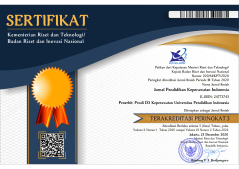The Effectiveness of Internet Addiction Mobile Application on Sleep Quality of Internet-Addicted Students
Abstract
ABSTRACT
Excessive internet use causes addiction leading to obsessive-compulsive behavior, depression, anxiety, juvenile delinquency, and sleep disorders. Poor sleep quality will reduce the ability to think, increase the risk of accidents, hormonal metabolism disorders during puberty and menstruation, excessive fatigue during the day, and impaired activities in work, school, and social functions. Internet addiction therapy is often carried out after complaints of severe symptoms such as social isolation, depression, and the risk of suicide. Patients must be hospitalized, which takes a long time and cost. Thus, developments are carried out to overcome the problem of internet addiction by preventing, screening, and intervening in internet addiction in a practical, effective, safe, and economical way using mobile applications. This study aimed to identify the effectiveness of internet-addiction mobile applications on internet-addicted students' sleep quality. A quasi-experimental using non-equivalent control group design with pre-test and post-test. The research instrument used was the Internet Addiction Test (IAT) and the Pittsburgh Sleep Quality Index (PSQI). This study used a consecutive sampling of 46 people for the intervention and control groups. Data were analyzed using the McNemar test. Internet-Addiction Mobile Application significantly improved sleep quality for students who experienced internet addiction (60,9%) experienced good sleep quality. Furthermore, Internet-Addiction Mobile Application can significantly reduce internet addiction (p-value = 0.04). Internet-Addiction Mobile Application effectively improves students' sleep quality who experience internet addiction. This information can be used as data to prevent and intervene in sleep quality problems in people with internet addiction.
Keywords
References
Awasthi, A. A., Taneja, N., Maheshwari, S., & Gupta, T. (2020). Prevalence of Internet Addiction, Poor Sleep Quality, and Depressive Symptoms Among Medical Students: A Cross-Sectional Study. Osong Public Health and Research Perspectives, 11(5), 303-308.
Çelebioğlu, A., Özdemir, A. A., Küçükoğlu, S., & Ayran, G. (2020). The effect of Internet addiction on sleep quality in adolescents. Journal of Child and Adolescent Psychiatric, 33(4), 221-228.
Chandrashekar, P. (2018). Do mental health mobile apps work: evidence and recommendations for designing high-efficacy mental health mobile apps. MHealth, 4, 6–6.
Chao, C.-M., & Yu, T.-K. (2017). Associations among Different Internet Access Time, Gender and Cyberbullying Behaviors in Taiwan’s Adolescents. Frontiers in Psychology, 8, 1-10.
Chaput, J. P., Dutil, C., & Sampasa-Kanyinga, H. (2018). Sleeping hours: what is the ideal number and how does age impact this?. Nature and Science of Sleep, 10, 421-430.
Cordi, M. J., Ackermann, S., & Rasch, B. (2019). Effects of Relaxing Music on Healthy Sleep. Scientific Reports, 9(1), 1-9.
Ercan, S., Acar, H. T., Arslan, E., Canbulut, A., Oğul, A., & Çetin, C. (2021). Effect of Internet Addiction on Sleep Quality, Physical Activity and Cognitive Status Among University Students. Journal of Turkish Sleep Medicine, 1, 49–56.
Evcılı Funda, & Yurtsever Ilkay. (2018). Problematic Internet Use, Sleep Quality and Academic Achievement In Turkish University Students. Adolescent Psychiatry, 8, 185–194.
Firth, J., Torous, J., Nicholas, J., Carney, R., Rosenbaum, S., & Sarris, J. (2017). Can smartphone mental health interventions reduce symptoms of anxiety? A meta-analysis of randomized controlled trials. Journal of Affective Disorders, 218, 15–22.
Hassan, T., Alam, M. M., Wahab, A., & Hawlader, M. D. (2020). Prevalence and associated factors of internet addiction among young adults in Bangladesh. Journal of the Egyptian Public Health Association, 95(1), 1–8.
Herliandry, L. D., Nurhasanah, N., Suban, M. E., & Kuswanto, H. (2020). Pembelajaran pada masa pandemi covid-19. JTP-Jurnal Teknologi Pendidikan, 22(1), 65–70.
Jalali, R., Khazaei, H., Paveh, B. K., Hayrani, Z., & Menati, L. (2020). The Effect of Sleep Quality on Students’ Academic Achievement. Advances in Medical Education and Practice, 11, 497–502.
Kamaruddin, S., Nabila, N., & Qie, K. E. (2019). Imposing penalty for internet addiction in malaysia: Lesson from South Korea. Int. J. Recent Technol. Eng, 7, 1601–1605.
Kokka, I., Mourikis, I., Nicolaides, N. C., Darviri, C., Chrousos, G. P., Kanaka-Gantenbein, C., & Bacopoulou, F. (2021). Exploring the Effects of Problematic Internet Use on Adolescent Sleep: A Systematic Review. International Journal of Environmental Research and Public Health, 18(2), 1–14.
Kurniasih, N. (2017). Internet Addiction, Lifestyle or Mental Disorder? A Phenomenological Study on Social Media Addiction in Indonesia. KnE Social Sciences, 2(4), 135–144.
Lau, J. T. F., Gross, D. L., Wu, A. M. S., Cheng, K. man, & Lau, M. M. C. (2017). Incidence and predictive factors of Internet addiction among Chinese secondary school students in Hong Kong: a longitudinal study. Social Psychiatry and Psychiatric Epidemiology, 52(6), 657–667.
Lozano-Blasco, R., Robres, A. Q., & Sánchez, A. S. (2022). Internet addiction in young adults: A meta-analysis and systematic review. Computers in Human Behavior, 130, 1-7.
Maulida, R., & Sari, H. (2017). Kaitan Internet Addiction Dan Pola Tidur Pada Mahasiswa Fakultas Keperawatan. Jurnal Ilmiah Mahasiswa Fakultas Keperawatan, 2(3), 1-8.
Quanbeck, A., Gustafson, D. H., Marsch, L. A., Chih, M.-Y., Kornfield, R., McTavish, F., … Shah, D. v. (2018). Implementing a Mobile Health System to Integrate the Treatment of Addiction Into Primary Care: A Hybrid Implementation-Effectiveness Study. J Med Internet Res, 20(1), 1-10.
Rini, M. K., & Huriah, T. (2020). Prevalensi dan Dampak Kecanduan Gadget Pada Remaja: Literature Review. Jurnal Keperawatan Muhammadiyah, 5(1), 185-194.
Rohith, S. S. (2020). Internet addiction and its influence on sleep quality among the medical students. Editors’ Note, 3(2), 30-91.
Sari, A. P., Ilyas, A., & Ifdil, I. (2017). Tingkat Kecanduan Internet pada Remaja Awal. JPPI (Jurnal Penelitian Pendidikan Indonesia), 3(2), 110–117.
Simmons, L., Crook, A., Cannonier, C., & Simmons, C. (2018). There’s an app for that: The impact of reminder apps on student learning and anxiety. Journal Education for Business, 93(5), 185–195.
Su, W., Han, X., Yu, H., Wu, Y., & Potenza, M. N. (2020). Do men become addicted to internet gaming and women to social media? A meta-analysis examining gender-related differences in specific internet addiction. Computers in Human Behavior, 113, 1-23.
Trahan, T., Durrant, S. J., Müllensiefen, D., & Williamson, V. J. (2018). The music that helps people sleep and the reasons they believe it works: A mixed methods analysis of online survey reports. PloS One, 13(11), 1-10.
Vaghefi, I., & Tulu, B. (2019). The Continued Use of Mobile Health Apps: Insights From a Longitudinal Study. JMIR MHealth and UHealth, 7(8), 12983–12983.
Vondráčková, P., & Gabrhelik, R. (2016). Prevention of Internet addiction: A systematic review. Journal of Behavioral Addictions, 5(4), 586-579.
Yin, H., Wardenaar, K. J., Wang, Y., Wang, N., Chen, W., Zhang, Y., … Schoevers, R. A. (2020). Mobile Mental Health Apps in China: Systematic App Store Search. J Med Internet Res, 22(7), 1-10.
DOI: https://doi.org/10.17509/jpki.v8i2.50672
Refbacks
- There are currently no refbacks.
Jurnal Pendidikan Keperawatan Indonesia(JPKI) published by Indonesia University of Education. JPKI is licensed under a Creative Commons Attribution-ShareAlike 4.0 International License.
Statcounter
Office :
Nursing Department. FPOK UPI.
229, Dr. Setiabudhi Street. Bandung 40154
West Java , Indonesia
E-mail : jpki@upi.edu

_.png)
_.png)
_.png)











